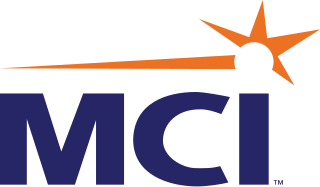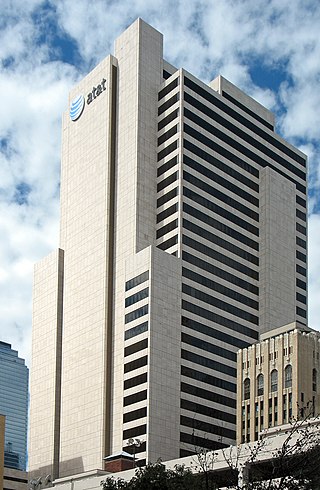Related Research Articles

MCI, Inc. was a telecommunications company. For a time, it was the second-largest long-distance telephone company in the United States, after AT&T. WorldCom grew largely by acquiring other telecommunications companies, including MCI Communications in 1998, and filed for bankruptcy in 2002 after an accounting scandal, in which several executives, including CEO Bernard Ebbers, were convicted of a scheme to inflate the company's assets. In January 2006, the company, by then renamed MCI, was acquired by Verizon Communications and was later integrated into Verizon Business.

XM Satellite Radio (XM) was one of the three satellite radio (SDARS) and online radio services in the United States and Canada, operated by Sirius XM Holdings. It provided pay-for-service radio, analogous to subscription cable television. Its service included 73 different music channels, 39 news, sports, talk and entertainment channels, 21 regional traffic and weather channels, and 23 play-by-play sports channels. XM channels were identified by Arbitron with the label "XM".

MCI Communications Corporation was a telecommunications company headquartered in Washington, D.C. that was at one point the second-largest long-distance provider in the United States.

Magyar Telekom Nyrt. is one of the leading Hungarian telecommunications service provider company. It is a subsidiary of Deutsche Telekom.
Jamba is a German company that created and marketed ringtones for mobile phones. It operated under the name Jamster in China, Armenia, Georgia, Saudi Arabia, Iran, Oman, France, Kuwait, Turkey, Switzerland, Kazakhstan, Austria, Brazil, Israel, the United Arab Emirates, the United Kingdom, the United States, Sweden, Iraq, Poland and Malaysia.
Portal Software, Inc., was founded in 1985 as Portal Information Network, one of the first Internet service providers in the San Francisco Bay Area. It was founded by John Little. The company offered its own interface through modem access that featured Internet email. Towards the end of the 1980s, the company offered FTP.

Clear Communications was a telecommunications company based in New Zealand. Until merging into Telstra's operations in 2001, it was the biggest rival to Telecom New Zealand.
Mobile phone content advertising is the promotion of ring tones, games and other mobile phone services. Such services are usually subscription-based and use the short message service (SMS) system to join up to them. Another method is broadcasting messages to the mobile phone's idle-screen, enabling the mobile operators or advertisers to reach millions in real-time. The advertising and sale of ring tones in particular has seen a massive growth in recent years, with some commercial breaks, particularly on music television channels and in motor racing, being dominated by such adverts. Advertising in newspapers and magazines has also become popular.

Verifone is an American multinational corporation headquartered in Coral Springs, Florida. Verifone provides technology for electronic payment transactions and value-added services at the point-of-sale. Verifone sells merchant-operated, consumer-facing and self-service payment systems to the financial, retail, hospitality, petroleum, government and healthcare industries. The company's products consist of POS electronic payment devices that run its own operating systems, security and encryption software, and certified payment software, and that are designed for both consumer-facing and unattended environments.

Telecommunication Company of Iran, or TCI, is the fixed-line incumbent operator in Iran offering services in fixed telephony, DSL and data services for both residential and business customers, all throughout the country. It was established in 1971 with a new organizational structure as the main responsible administration for the entire telecommunication affairs.
Dennis F. Strigl is an American corporate executive. He is the retired president, chief executive officer, and chief operating officer of Verizon Wireless, responsible for operations at Verizon Telecom, Verizon Wireless and Verizon Business. He was appointed on January 1, 2007, and worked for Verizon for about three years until his retirement on December 31, 2009.
Kollective Technology Inc, formerly Kontiki Inc, is a cloud-based, software-defined enterprise content delivery (SD-ECDN) company headquartered Bend, Oregon, in the United States. Operating in 190 countries with locations across America, Europe and APAC, it employs 117 people around the world and provides its services to over 135 customers.
Sirius XM Holdings Inc. is an American broadcasting corporation headquartered in Midtown Manhattan, New York City, that provides satellite radio and online radio services operating in the United States. The company was formed by the 2008 merger of Sirius Satellite Radio and XM Satellite Radio, merging them into SiriusXM Radio. The company also has a 70% equity interest in Sirius XM Canada, an affiliate company that provides Sirius and XM service in Canada. On May 21, 2013, Sirius XM Holdings, Inc. was incorporated, and in January 2020, SiriusXM reorganized their corporate structure, which made Sirius XM Radio Inc. a direct, wholly owned subsidiary of Sirius XM Holdings, Inc.
Richard C. Notebaert is the former Chairman and CEO of Qwest, Tellabs and Ameritech. He was credited for saving Qwest from bankruptcy, and making Ameritech the most successful "Baby Bell".
Lucille Anne Hood, commonly known as Lucy Hood, was the founder of Fox Mobile Entertainment and the Executive Director of the Institute for Communication Technology Management (CTM) at the University of Southern California. Hood guided the Institute's strategy and its consortium of corporate members, which include AT&T, Verizon, Hewlett-Packard, Cisco, Qualcomm, Motorola Mobility, Alcatel-Lucent, Disney, Fox and Ogilvy & Mather. Hood was also a member of the faculty at USC's Marshall School of Business.
Gregory Q. Brown is an American businessman. He has been chairman and chief executive officer of Motorola Solutions since 2008.

AT&T Inc. is an American multinational telecommunications holding company headquartered at Whitacre Tower in Downtown Dallas, Texas. It is the world's third-largest telecommunications company by revenue and the largest wireless carrier in the United States. As of 2023, AT&T was ranked 13th on the Fortune 500 rankings of the largest United States corporations, with revenues of $120.7 billion.
Michael J. Homer was an American electronics and computer industry executive who played major roles in the development of the personal computer, mobile devices and the Internet.
Lumen Technologies, Inc. is an American telecommunications company headquartered in Monroe, Louisiana, that offers communications, network services, security, cloud solutions, voice, and managed services. The company was a member of the Fortune 500 and the S&P 500 index from 1999 until 2023. Its communications services include local and long-distance voice, broadband, Multi-Protocol Label Switching (MPLS), private line, Ethernet, hosting, data integration, video, network, public access, Voice over Internet Protocol (VoIP), information technology, and other ancillary services. Lumen also serves global enterprise customers across North America, Latin America, EMEA, and Asia Pacific.

Martin A. Nisenholtz is an American businessman and educator who has been active in the advancement of digital media and marketing.
References
- ↑ InternetNews Realtime IT News – e.spire Aspires to Become National ISP
- ↑ Executive Dossier: Vernon Irvin - Interview | CommunicationsWeek International|Find Articles at BNET.com
- ↑ "Consulting Magazine/Firm Profiles". Archived from the original on 2006-12-07. Retrieved 2006-12-28.
- ↑ News Corporation
- ↑ News Corp. takes majority stake in Jamba | CNET News.com
- ↑ Career Moves: October 23, 2006 | Digital Media Wire Archived September 27, 2007, at the Wayback Machine
- ↑ "Vernon Irvin, Executive Vice President, VeriSign, Telecommunications Services Group,Content owner to connected consumer - managing the digital content ecosystem". Archived from the original on 2006-06-16. Retrieved 2006-12-28.